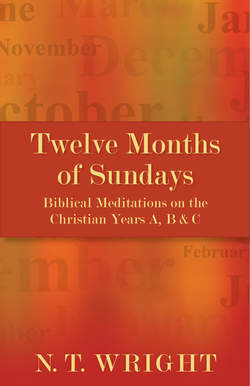Читать книгу Twelve Months of Sundays - N.T. Wright - Страница 47
На сайте Литреса книга снята с продажи.
ОглавлениеProper 6
Genesis 18.1–15
Romans 5.1–8
Matthew 9.35—10.8 [9–23]
Take the gospel reading (the longer version) and lay it, like a template, over the life of the average parish. What do you find?
I know, I know. We don’t live in the first century; we aren’t peasants; Jesus’ mission was unique; the disciples’ mission predated Calvary, Easter and Pentecost; the special and urgent ministry to Israel (10.6, 23) was later transformed, by Jesus himself (Matthew 28.19) into the wider and more long-lasting mission to all the nations.
All this I know. But it remains disturbing that the only point of contact between what Jesus told his twelve followers and what the average churchworker does with most of her or his waking hours is that we wander around like sheep among wolves. We know that Jesus told us to be wise as serpents and innocent as doves, but most of us, being after all busy people, find it advisable to specialize.
Of course you can’t lift culturally specific instructions off the page and plonk them down elsewhere. But when did anyone last make the effort to get inside this passage and wrestle with the question: what would be the functional equivalent, the necessary re-application, of Matthew 10 in today’s Church? The fact that we haven’t done this (when did you last, metaphorically, shake the dust off your feet when leaving a house or town?) may of course explain the fact that our gospel, our lifestyle, threatens no one; no one arrests us for doing our job, no one betrays us to the authorities. Unless, of course, certain newspapers count as authorities.
The shock of facing up to these questions is the characteristic shock of the gospel. Life is supposed to be different. Sarah will have a son; yes, it’s impossible, yes, she did laugh, and yes, it’s going to happen anyway. When the great rolling wave of God’s love comes at you, don’t try to fight it; launch out and let it knock you off your feet. That’s what Paul is talking about in Romans 5 (the paragraph ends at verse 11, by the way). God’s action begins with love and ends with celebration, taking in suffering en route; a good trinitarian thought for this time of the year, echoing with memories of the three who visited Abraham.
The narrative of Genesis is effortlessly subtle. Is ‘the Lord’ one of the three men (they have become two angels in 19.1, while ‘the Lord’ has been talking to Abraham)? Or somehow all three together? As in the Emmaus scene, God’s self-revelation is set in the context of hospitality, in this case the lavish and generous care of a Bedouin host forgetting his status and acting as servant, giving, as he has received, freely. Do Jesus’ instructions to his followers, though, somehow imply that they are also to be like the three men, going about with great promises and great warnings? Dare we take that seriously as a model of the Church and its mission?
